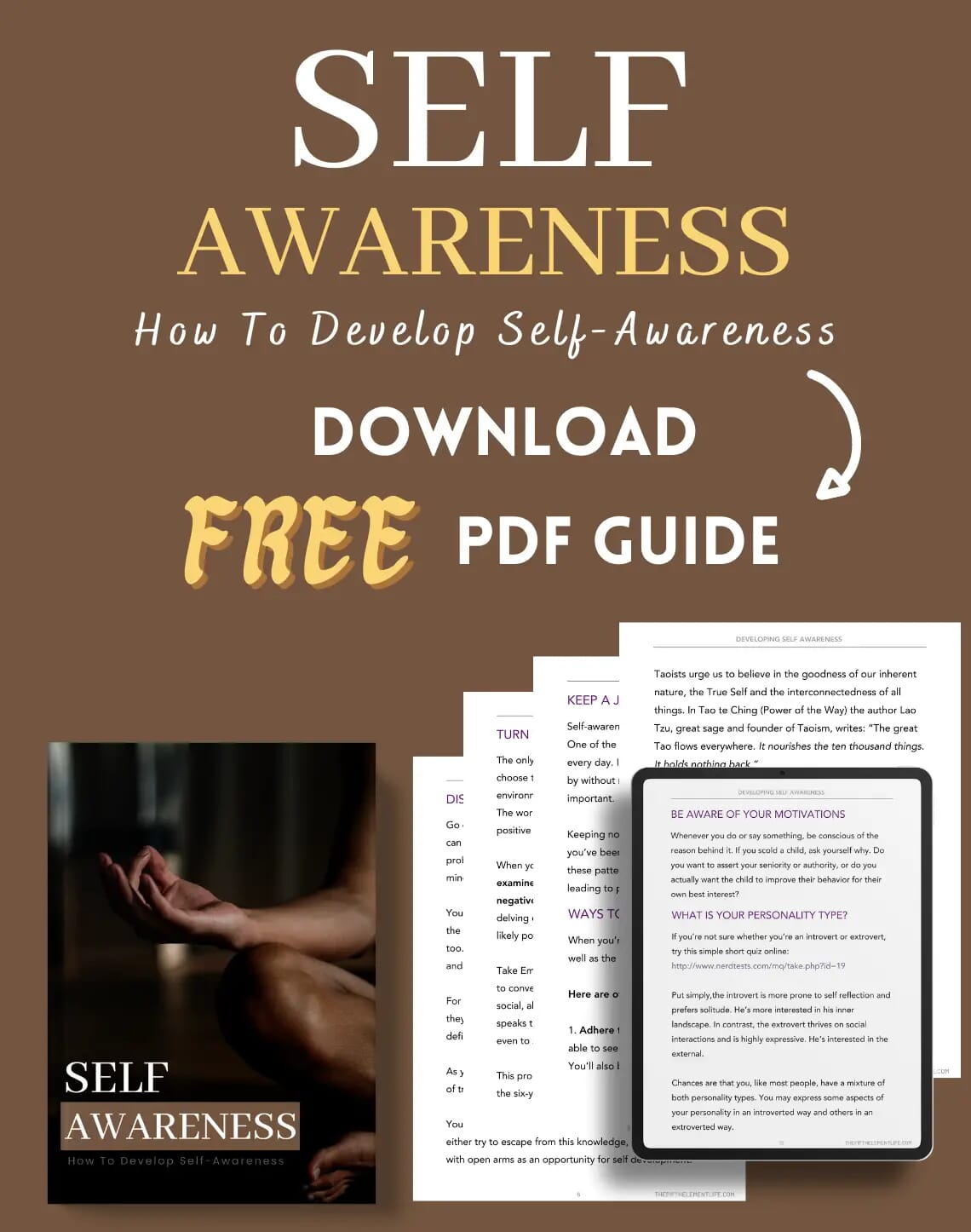Last Updated on April 17, 2024
Life’s road is filled with twists and turns, but if there’s one thing I’ve learned in my life it’s that challenges are the stepping stones to greatness. But have you wondered how to overcome challenges?
Although everyone has the power within them to overcome anything that comes their way, using a helpful tool to aid you along the way is always a great idea.
Which is exactly why I’m thrilled to introduce you to the transformative power of the “How to Overcome Challenges” online journal.
This journal isn’t just your ordinary companion—it’s a catalyst for growth, a beacon of inspiration, and it’s yours for FREE!
Inside, you’ll discover powerful strategies, personal anecdotes, and actionable steps to conquer challenges and unlock the boundless potential that lies within you.

Life’s journey is a complex tapestry, woven with a myriad of challenges that test our resilience and shape our character.
As a young woman navigating the twists and turns of life, I have encountered a diverse range of obstacles that have propelled me towards personal growth and empowered me to reach new heights.
In this section, we will explore some common challenges many of us face and delve into how these hurdles can become catalysts for transformation and success.
RELATED: 400 Profound Quotes About Life To Live With More Purpose & Intention
Personal Growth and Self-Discovery
Life is a continuous journey of self-discovery, where we encounter challenges that push us beyond our comfort zones.
These challenges may involve exploring our passions, defining our values, or overcoming self-doubt.
Embracing these moments of uncertainty allows us to embark on a path of personal growth and forge a deeper connection with ourselves.
By cultivating self-awareness, seeking opportunities for personal development, and engaging in introspection, we can overcome these challenges and embark on a transformative journey of self-discovery.
Throughout my own early adulthood, I grappled with a sense of self-doubt and uncertainty about my purpose in life.
It was during this time that I decided to embark on a solo travel adventure.
Stepping out of my comfort zone and immersing myself in unfamiliar cultures and experiences provided a profound shift in perspective.
Through this journey, I discovered hidden strengths, gained clarity about my passions, and embraced a renewed sense of self-confidence.
This experience taught me the power of pushing past my fears and embracing challenges as opportunities for personal growth.
Balancing Personal and Professional Life
As a young woman, finding a harmonious balance between personal aspirations and professional endeavors can be a significant challenge.
The demands of career growth, family responsibilities, and personal interests often compete for our time and attention.
However, by setting clear priorities, establishing boundaries, and practicing self-care, we can create a sustainable balance that allows us to pursue our dreams while nurturing our personal well-being.
In my own journey, I encountered the struggle of balancing a demanding career and personal commitments.
I realized the importance of establishing boundaries and learning to say no when necessary.
By prioritizing self-care, setting aside dedicated time for personal pursuits, and seeking support from loved ones, I was able to find a sense of equilibrium.
RELATED: 132 Fabulous Confident Affirmations To Build Self-Assurance
This experience taught me that by nurturing ourselves and aligning our actions with our values, we can create a fulfilling and balanced life.
Overcoming Fear of Failure
Fear of failure often looms large when pursuing our dreams and aspirations.
It can hold us back from taking risks, exploring new opportunities, and stepping into our true potential.
However, failure is an inevitable part of growth and learning.
By reframing failure as a stepping stone towards success, embracing a growth mindset, and cultivating self-compassion, we can overcome the fear of failure and unlock our full potential.
In my own experience of chasing my dreams, I encountered numerous setbacks and moments of failure.
Each disappointment served as a valuable lesson, teaching me resilience, adaptability, and the importance of perseverance.
By embracing failure as an opportunity for growth, I was able to reframe my mindset and approach challenges with renewed determination.
This experience taught me that failure is not an endpoint but a stepping stone towards success.
How To Overcome Challenges

Cultivate Resilience: Building Strength in the Face of Challenges
Life is filled with ups and downs, and developing resilience is crucial for overcoming challenges.
Resilience allows us to bounce back from setbacks, adapt to change, and maintain a positive outlook.
Here are some practical strategies to cultivate resilience:
- Reframe Setbacks: Instead of viewing setbacks as failures, reframe them as opportunities for growth and learning. Recognize that challenges are a natural part of life and provide valuable lessons. By shifting your perspective, you can extract valuable insights and approach future challenges with a more resilient mindset.
- Practice Self-Compassion: Treat yourself with kindness and understanding during difficult times. Practice self-compassion by acknowledging your emotions and avoiding self-criticism. Remember that everyone faces challenges, and you deserve empathy and support, including from yourself. Treat setbacks as moments to practice self-compassion and nurture your inner strength.
- Foster Supportive Relationships: Surround yourself with supportive and positive influences. Seek out friends, family members, or mentors who can provide guidance, encouragement, and a listening ear. Sharing your challenges with trusted individuals can provide a fresh perspective, emotional support, and practical advice. Building a network of supportive relationships can bolster your resilience.
- Develop Coping Mechanisms: Discover healthy coping mechanisms that work for you. Engage in activities that help you manage stress, such as exercise, meditation, journaling, or engaging in hobbies. Find what brings you joy and helps you maintain emotional balance. These coping mechanisms serve as vital tools to navigate challenges and enhance your overall well-being.
Breaking It Down: Overcoming Challenges One Step at a Time
When confronted with significant challenges, breaking them down into manageable steps can alleviate overwhelm and provide a clear path forward.
Here are some strategies to help you break down challenges effectively:
- Define Your Goal: Start by clarifying your desired outcome. Identify what you want to achieve or overcome. Having a clear goal provides direction and motivation for the steps that follow.
- Identify Key Tasks: Break down the challenge into smaller, actionable tasks. Each task should be specific, measurable, achievable, relevant, and time-bound (SMART). Consider the necessary actions, resources, and information needed to complete each task successfully.
- Prioritize and Sequence: Determine the order in which you will tackle each task. Prioritize them based on urgency, importance, or logical progression. Sequencing the tasks ensures a systematic approach and keeps you focused on the immediate steps at hand.
- Set Milestones: Establish milestones to track your progress. Celebrating these smaller achievements along the way can provide a sense of accomplishment and motivate you to continue moving forward.
- Evaluate and Adjust: Regularly review your plan and assess your progress. Adapt your strategy if needed, addressing any unforeseen obstacles or changes. Flexibility and adaptability are key when facing challenges.
By breaking down challenges into manageable steps, you can maintain focus, track progress, and build confidence as you overcome each task.
Remember, it’s the small victories that lead to conquering the larger challenge.
RELATED: 174 Powerful Questions To Understand Who You Truly Are
Seeking Support: Building a Network for Success
Facing challenges alone can be overwhelming and emotionally draining.
Seeking support from others can provide valuable insights, encouragement, and a fresh perspective.
Here are some ways to help you build a supportive network:
- Identify Trusted Individuals: Reach out to friends, family members, mentors, or colleagues whom you trust and respect. Choose individuals who have your best interests at heart and are willing to offer guidance and support during challenging times.
- Share Your Challenges: Openly communicate your challenges with your support network. Articulate your concerns, fears, and aspirations. By sharing your experiences, you create an environment for empathy and understanding. Expressing your challenges allows others to relate and offer their perspectives, insights, and potential solutions.
- Seek Professional Help: Sometimes, challenges require specialized guidance. Consider reaching out to professionals such as therapists, counselors, or coaches who can provide expert advice and support tailored to your specific needs. They can offer tools, techniques, and strategies to help you navigate through difficult situations.
- Join Supportive Communities: Explore communities, groups, or forums that focus on topics related to your challenge. Online platforms and local organizations provide opportunities to connect with individuals who have faced similar obstacles. Sharing experiences and learning from others’ journeys can inspire and motivate you to overcome your own challenges.
- Reciprocate Support: Building a support network is a two-way street. Be willing to offer your support and assistance to others who may be facing their own challenges. By cultivating a supportive community, you create a reciprocal environment where everyone benefits from shared experiences and collective wisdom.
RELATED: 252 Powerful One Word Affirmations To Begin Manifesting
Remember, seeking support is not a sign of weakness but a demonstration of strength.
Embracing the help and guidance of others can provide fresh perspectives, insights, and encouragement as you navigate through life’s challenges.
Making a Plan of Action: Empowering Steps Towards Success

When faced with challenges, having a well-structured plan of action can provide a roadmap for success.
It helps you stay organized, focused, and proactive in finding solutions.
Here are key steps to create an effective plan of action:
- Define Your Objective: Clearly articulate what you want to achieve or overcome. Having a specific and measurable objective keeps you aligned and motivated throughout the process. It provides a sense of purpose and direction.
- Assess the Situation: Take a comprehensive look at the challenge you’re facing. Evaluate the factors contributing to the challenge, potential obstacles, and available resources. Understanding the landscape allows you to develop a more informed and effective plan.
- Set SMART Goals: Break down your objective into smaller, achievable goals that are Specific, Measurable, Attainable, Relevant, and Time-bound (SMART). Each goal should be clear, quantifiable, realistic, and have a deadline. SMART goals keep you focused and provide measurable milestones along your journey.
- Identify Strategies and Actions: Determine the strategies and actions necessary to achieve your goals. Brainstorm potential solutions, research best practices, and seek advice from experts or mentors. Create a list of actionable steps that will move you closer to your objectives.
- Prioritize and Sequencing: Determine the order in which you will tackle your action steps. Prioritize them based on their importance, urgency, or logical progression. Sequencing ensures a systematic approach and minimizes overwhelm.
- Assign Resources and Timelines: Allocate the necessary resources, whether they are financial, informational, or human. Identify the people or tools you need to support your plan. Set realistic timelines for each action step, considering your available time and commitments.
- Regular Evaluation and Adjustments: Continuously monitor and evaluate your progress. Celebrate achievements, and identify any areas where adjustments are needed. Be flexible and open to modifying your plan if circumstances change or new opportunities arise.
- Stay Accountable: Share your plan with someone you trust and ask them to hold you accountable. Regular check-ins or progress updates with a supportive individual can help you stay on track and provide encouragement along the way.
Embracing Growth: Lessons Learned from Challenges

Challenges are not only tests of our strength but also opportunities for growth and self-discovery.
By approaching them with an open mindset, we can extract valuable lessons and insights that shape our personal and professional development.
Here are some key aspects to consider:
- Reflect on Your Experience: Take time to reflect on the challenges you have faced and the lessons they have taught you. What have you learned about yourself, your capabilities, and your resilience? Reflecting allows you to gain a deeper understanding of your experiences and extract wisdom that can guide you in future endeavors.
- Embrace Change and Adaptation: Challenges often bring change and require us to adapt. Embracing change with an open mind and a willingness to adapt allows us to navigate uncertain situations more effectively. Embracing change means recognizing that growth often happens outside of our comfort zones.
- Foster a Growth Mindset: Cultivate a growth mindset, the belief that challenges are opportunities for learning and improvement. See setbacks as stepping stones and failures as valuable feedback. Embrace a mindset that views challenges as a necessary part of personal growth and development.
- Seek Learning Opportunities: Actively seek out opportunities to learn and grow from your challenges. Look for resources, books, courses, or workshops that can enhance your knowledge and skills in areas related to the challenges you face. Seek out mentors or experts who can offer guidance and support in your journey.
- Develop Resilience and Emotional Intelligence: Challenges can test our resilience and emotional well-being. Focus on developing emotional intelligence, the ability to understand and manage your emotions and those of others. Build resilience by cultivating healthy coping mechanisms and seeking support when needed.
- Celebrate Your Achievements: Acknowledge and celebrate your achievements, no matter how small they may seem. Recognize the progress you have made and the growth you have experienced throughout your journey. Celebrating achievements boosts confidence and motivation to face future challenges.
- Share Your Story: Consider sharing your experiences and insights with others. By sharing your challenges and how you overcame them, you inspire and empower others who may be facing similar obstacles. Your story can offer hope, guidance, and encouragement to those in need.
Remember, challenges are not roadblocks but opportunities for growth.
Embracing the lessons learned from challenges allows us to evolve into stronger, wiser individuals.
RELATED: 114 Powerful Quotes To Build A Healthy & Respectful Relationship
Introducing the “How to Overcome Challenges” Journal
In a world filled with uncertainties and obstacles, having a practical guide to conquer challenges is invaluable.
That’s why we present to you the “How to Overcome Challenges” journal—a transformative resource designed to empower you on your journey to success.
With its insightful sub-sections and actionable advice, this journal will equip you with the necessary tools to navigate through life’s toughest trials.
Let’s explore the chapters and their sub-sections, each offering valuable insights and strategies for overcoming challenges:
Chapter 1: Introduction
- Get Your Mind on Track: Explore the power of mindset and how it shapes your perception of challenges. Learn techniques to cultivate a positive and resilient mindset that sets the stage for overcoming obstacles.
- Look for the Silver Lining: Discover the hidden opportunities within challenges and how reframing adversity can lead to personal growth and self-discovery.
Chapter 2: Finding Solutions
- What are the Next Steps You Can Take to Make it Better: Uncover practical steps to assess and address challenges effectively. Gain strategies for problem-solving, brainstorming solutions, and taking proactive action.
- Stay Away from Unproductive “What Ifs”: Learn how to avoid the trap of unproductive worry and self-doubt. Explore techniques to shift your focus from dwelling on negative possibilities to embracing positive outcomes.
- Take Advantage of the Resources Available to You: Identify and leverage the resources and support systems around you. Discover how to tap into your network, seek guidance from mentors, and utilize available tools to overcome challenges.
RELATED: 217 Motivating Quotes On Making A Difference To Help You Effect Positive Change
Chapter 3: Make a Plan of Action
- Your Plan: Create a well-structured plan of action to navigate challenges strategically. Learn how to define clear objectives, set achievable goals, and outline actionable steps to progress towards success.
- Take Decisive Action: Develop the confidence to take decisive action, even in the face of uncertainty. Overcome analysis paralysis and learn to trust your instincts as you move forward towards your goals.
Chapter 4: Learn from Your Challenges
- Remember the Negatives Too: Embrace the lessons embedded within challenging experiences. Discover the importance of reflecting on both the positive and negative aspects of your journey and using them as valuable insights for personal growth.
Next Steps: Embracing the Journey
Now that you’ve gained insights into overcoming challenges and the valuable resources offered by the “How to Overcome Challenges” journal, it’s time to take the next steps towards your personal growth and success.
Here are some actionable steps to guide you on your journey:
- Get Your Copy: Obtain your own copy of the “How to Overcome Challenges” journal and immerse yourself in its transformative content. Having it by your side will serve as a constant reminder of your commitment to overcoming challenges.
- Create Your Action Plan: Take some time to reflect on the challenges you’re currently facing or anticipate encountering in the future. Use the journal’s chapters and subsections as a framework to develop a personalized action plan. Break down your challenges into manageable steps and set specific goals to address them effectively.
- Utilize Journal Prompts: Dive deeper into your thoughts and experiences by utilizing journal prompts. These prompts are designed to help you reflect, gain clarity, and develop a deeper understanding of yourself and your challenges. Dedicate regular time to engage with prompts and let your thoughts flow onto the pages of the journal.
Here are some examples:
- Reflect on a recent challenge you faced and describe how it made you feel. What were the main obstacles, and how did you initially react to them?
- Write about a time in your life when you overcame a significant hurdle. What lessons did you learn from that experience, and how did it shape your perspective?
- Identify three personal strengths that have helped you overcome challenges in the past. How can you leverage these strengths to tackle current obstacles?
- Think about a fear or limiting belief that has held you back. Write a letter to yourself, encouraging and empowering you to overcome this fear and embrace a new mindset.
- Imagine yourself as the hero of your own story. Describe a challenging situation you’re currently facing, and write a narrative of how you triumph over it, using your strengths, resources, and resilience.
- Seek Support: Remember that you don’t have to face challenges alone. Reach out to trusted friends, family members, or mentors who can provide guidance, encouragement, and a listening ear. Share your journey with them and allow their support to uplift and motivate you along the way.
- Take Action: It’s not enough to have a plan; action is key to overcoming challenges. Start implementing the steps outlined in your action plan, one by one. Celebrate each small victory and use the momentum to keep moving forward. Remember, progress is made through consistent effort and perseverance.
- Embrace Growth and Learn from Setbacks: As you navigate challenges, embrace the opportunity for growth and learning. Be open to the lessons that each experience offers, even if they come with setbacks or unexpected outcomes. Use these lessons to refine your approach, adjust your strategies, and continue on the path towards success.
- Celebrate Your Achievements: Throughout your journey, remember to celebrate your achievements, no matter how big or small. Take time to acknowledge your progress, reflect on how far you’ve come, and appreciate the resilience you’ve displayed. Celebrating achievements boosts your confidence, reinforces positive habits, and provides motivation for future endeavors.
RELATED: 100 Marvelous Good Morning To Family And Friends Quotes To Spread Happiness
Frequently Asked Questions
How can the “How to Overcome Challenges” journal benefit me?
The “How to Overcome Challenges” journal is designed to provide valuable insights, practical strategies, and a supportive framework to help you navigate and conquer various challenges in life.
It offers guidance on mindset shifts, finding solutions, creating action plans, and learning from experiences.
By utilizing the journal, you can develop resilience, gain clarity, and cultivate the confidence needed to overcome obstacles and achieve personal growth.
Absolutely! The “How to Overcome Challenges” journal is a versatile resource that can be applied to a wide range of challenges, including those related to career, relationships, personal development, and more.
The principles and strategies discussed within the journal can be tailored to suit your specific circumstances and goals, empowering you to tackle challenges in various areas of life.
Is the journal suitable for individuals of all ages and backgrounds?
Yes, the “How to Overcome Challenges” journal is designed to be inclusive and applicable to individuals of all ages and backgrounds.
Whether you’re a student, a working professional, a parent, or someone navigating life’s transitions, this journal can provide valuable insights and strategies to help you overcome challenges and achieve personal growth.
Can I use this journal alongside other self-improvement practices or therapies?
Yes, the “How to Overcome Challenges” journal can complement other self-improvement practices, therapies, or personal development activities you may be engaged in.
It serves as a supportive tool to enhance your self-reflection, goal-setting, and action planning processes.
Combining the journal with other practices can provide a holistic approach to personal growth and resilience.
For sure! Sharing your progress and seeking support from others can be a valuable aspect of your journey.
The “How to Overcome Challenges” journal encourages you to engage with trusted friends, family members, or mentors who can offer guidance, motivation, and a listening ear.
Additionally, you can utilize the journal’s exercises to facilitate meaningful conversations or journaling sessions with others who are also on their path to overcoming challenges.
How long should I use the journal for optimal results?
The duration of using the journal may vary depending on your personal circumstances and the challenges you are facing.
It is recommended to engage with the journal consistently, dedicating regular time to reflect, plan, and take action.
You may find it helpful to establish a daily or weekly routine with the journal to maintain focus and momentum.
Is the “How to Overcome Challenges” journal available in a digital format?
Yes! The “How to Overcome Challenges” journal is actually an online journal, but can be printed into a physical one if desired.
You can choose the format that best suits your preferences and lifestyle. The digital version allows for easy accessibility on various devices, while the physical journal offers the tactile experience of writing and reflecting on paper.
Decide on whatever one aligns best with your personal preferences and makes your journaling experience the most enjoyable and convenient.
Continue Reading 👉: 174 Positive Quotes To Cultivate An Optimistic Mindset
- 49 Unique Self-Care Kit Ideas For Your Well-Being - February 14, 2024
- 85 Exciting And Encouraging Quotes About Trying New Things In Life To Inspire That First Step - February 14, 2024
- 125 Inspiring You Are Amazing Quotes For Yourself And The Special People In Your Life - February 14, 2024










